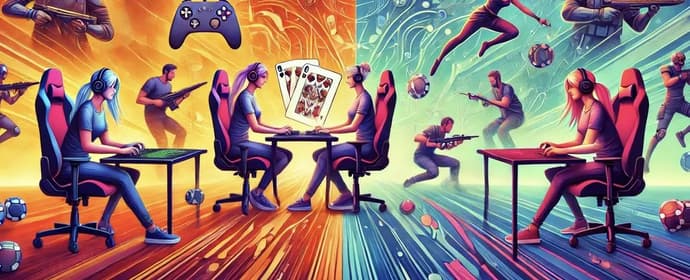
Balancing Individual Practice with Team Dynamics in Solo vs. Team Play

There's a fascinating movement taking place in the gaming world. It's subtle yet already well-formed. Myriad games are making their way to market as stand-alone attractions designed for solo play, with the option to ramp up the action into tourney-style spectacles. The concept itself is beautiful in simplicity yet groundbreaking at the same time. Imagine playing a game in a single-player format and then bringing those skills to the fore in a team-play scenario of sorts. It's an ingenious phenomenon that is sweeping across the gaming world.
Many games can be enjoyed in single-player mode, a.k.a. solo. Back then, a Sandbox PVP game known as Rust was all the rage. Players routinely attested to the monotony of solo play since Rust inherently favors group-based gaming. There is an overarching perspective that team-based play is intrinsically superior to solo play. Indeed, the very concept of team play is togetherness – synergy. That's highly enticing to players, and it resonates with fans worldwide. However, individual practice play can be fun, provided you’re playing your preferred games on the right platform.
Introducing the ultimate solo/team card game
Today, we look at one of the most incredible exponents of solo play/competitive play, thanks to dramatic technological advancements in the social gaming arena. Our game of choice is solitaire. Now, all solitaire games are fashioned around the same concept. A player is tasked with solving a rather tricky puzzle in a set time. As one of the most popular single-player card games anywhere, solitaire is relatively straightforward. However, like poker, it's challenging to win. The game is typically played with a single deck of cards, but rules may change depending on your playing variant.
Your goal in solitaire games is simple: build sequences. These include runs of cards in ascending or descending order. You can start with Ace and run up to King, or start with King and run down to Ace. It's your call. Most folks are well familiar with the game despite the nuanced play at different sites.
Here is the kicker—you have to finish the games within an allocated time, or you won't end up on the winning end of the spectrum. And if you keep using the undo button, you simply waste more time and decrease your chances of winning the game in under 300 seconds. Games are meant to be solved, especially puzzle-style games like Solitaire. Even though all 52 cards are in play, they may not be dealt in a way that allows you to win.
Making the transition from solo to team-style play
As an individual player, practice confers many benefits. These include skills development, self-assessment, and flexibility. You can always focus on developing your personal skills, gaming techniques, and strategies. This has many inherent advantages, notably gameplay mastery, improved reaction times, and better decision-making. However, self-assessment allows you to identify your core strengths and weaknesses sans external pressure. And since you can practice at your leisure, on your terms, it's always a great way to fine-tune your skills.
In a team situation, a lot changes. For one thing, there is usually coordination and communication with other players. Sometimes it’s as simple as checking a leaderboard to see where you’re at. By partnering with others, you can achieve common objectives. These are two important skills you develop that ultimately determine your success as part of a team. Typically, team-based play assigns specific roles to each player. Now, in a card game like Solitaire, it's possible to enjoy multiplayer action without any role changes. In other words, you play your normal game in a tournament format with other players playing their regular game. It's a different twist on a solitary game.
Tournament play is available to all players of legal age; when you play cash-style games in a tournament-style format, you can also win real cash prizes. SolitaireCash is an excellent example of a game where you get points even if you don't complete the game. Rankings are based on a points system – the higher you go, the better. Players can also purchase entry into tournaments where guaranteed prize pools exist. That's where the multiplayer elements come into play. It's an increasingly popular form of entertainment since players use their skills in games like Solitaire to back themselves in tournament play. And if you buy into to tourneys, you can use your skills to make a play for the rewards by competing against other skilled players.

Elen Stelmakh er en kreativ person som er opptatt av å fremme spillkulturen gjennom artikler og visuell design. Som heltidsansatt EGamersWorld-forfatter og designer for et spillnettsted skaper Elen ikke bare innhold, men tilfører det også energi og kreativitet.
 Hytale: Ryggsekkoppskrift og veiledningHer er guiden din til hvordan du lager en ryggsekk i Hytale, slik at du kan utvide beholdningen din for større eventyr i Orbis.
Hytale: Ryggsekkoppskrift og veiledningHer er guiden din til hvordan du lager en ryggsekk i Hytale, slik at du kan utvide beholdningen din for større eventyr i Orbis. Roblox Anime Guardians Koder februar 2026Oppdag alle fungerende Roblox Anime Guardians-koder. Løs inn gratis Mystic Coins, Trait Rerolls, Artefakter og belønninger.
Roblox Anime Guardians Koder februar 2026Oppdag alle fungerende Roblox Anime Guardians-koder. Løs inn gratis Mystic Coins, Trait Rerolls, Artefakter og belønninger. Ikke-britiske nettkasinoer: Spill, formater og hva spillere kan forventeNettkasinoer som opererer utenfor det britiske rammeverket for pengespill, tiltrekker seg oppmerksomhet på grunn av forskjeller i lisensmodeller, spillporteføljer og...
Ikke-britiske nettkasinoer: Spill, formater og hva spillere kan forventeNettkasinoer som opererer utenfor det britiske rammeverket for pengespill, tiltrekker seg oppmerksomhet på grunn av forskjeller i lisensmodeller, spillporteføljer og... Bitcoin-kasinoer og kryptospillplattformer for britiske spillereKryptobaserte spillplattformer har blitt et merkbart segment av det globale markedet for nettkasinoer.
Bitcoin-kasinoer og kryptospillplattformer for britiske spillereKryptobaserte spillplattformer har blitt et merkbart segment av det globale markedet for nettkasinoer.





